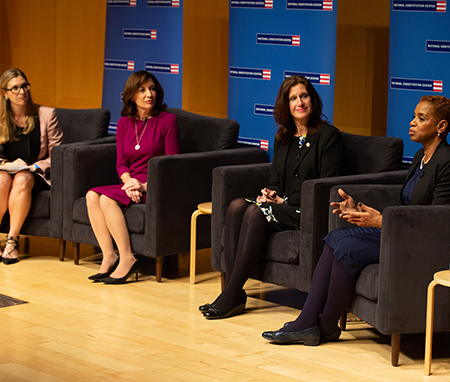In celebration of Juneteenth, political commentator Eddie Glaude Jr. discusses his newest book, We Are the Leaders We Have Been Looking For that explores how ordinary people, through the examples of leading Black Americans Martin Luther King Jr., Malcolm X, and Ella Baker, have the capacity to achieve a more just and perfect democracy. Thomas Donnelly, chief content officer at the National Constitution Center, hosts the discussion.
Video:
Podcast:
Participant:
Dr. Eddie Glaude Jr. is the James S. McDonnell Distinguished University Professor of African American Studies at Princeton University. He is a New York Times best-selling author and a former president of the American Academy of Religion. He is also on the Morehouse College Board of Trustees, and frequently appears in the media, as a columnist for TIME Magazine and as an MSNBC contributor. His most recent book is We Are the Leaders We Have Been Looking For (2024).
Additional Resources:
- Eddie S. Glaude Jr., We Are the Leaders We Have Been Looking For, (2024)
Excerpt from Interview: Eddie Glaude Jr. discusses a chapter in his book titled ‘A Heroism in Malcolm X. He talks about Malcolm X's role in his life and how he’s thought about him over time.
Eddie Glaude Jr.: That was a very hard chapter to write 'cause I began with a very painful moment in my own life with my own father. And trying to deal with a wounded masculinity, as it were. What does it mean for me to grow up on the coast, on the coast of Mississippi with this overbearing figure? I looked just like my father, and I love him to death. Today we have a wonderful relationship. But when I was a child I was definitely afraid of him. He could give me a glance and I would almost cry, shake in my skin as it were. And Malcolm became, for me, a resource to recapture a notion of manhood. He became that figure. When I got to Morehouse, I went to college at a very young age. I was 16, 15, 16 years old.
And I remember this Morehouse senior upperclassman saying, "You're incomplete. You don't know who you are." And he gave me Malcolm's autobiography, and I went back to my dorm room and I read it from cover to cover that night, and it was like a conversion experience. To this day, I have my goatee because of it. And so what happened is that Malcolm became a kind of heroic figure for me, because I found in him the language from my father's rage. I found in his witness my own discomfort coming from Mississippi, seeing all of the things that I saw, hearing the stories and of course knowing the stories that weren't told. So he helped me kind of fashion myself as a black man who's ready to engage in manly politics with other men, as it were.
And Ossie Davis has this wonderful, powerful formulation that you know of Malcolm as our shining dark prince. That's how he eulogized him. But as I became older and read more about him, particularly in Manning Marable's, which is a Pulitzer Prize winning biography, Malcolm became more human. He's trying to figure himself out. He's engaged in the arduous task of self-creation. And how he comes to us matters. And so I say there's one way to read the biography in light of Augustine's confessions, or you could read the autobiography in light of Rousseau's confessions. But what does it mean to read him as a guy who had to use Imani Perry's language, who's flailing and failing all the time once he leaves the nation of Islam. And what we see and how I end up is that he is a wounded witness.
So just as I did with Dr. King, I brought him down to the ground. The man who doesn't wanna smoke in public, the man who doesn't want to seem as if he is as human as the rest of us. Malcolm is just as wounded as I am. And what does that mean for me? It releases me into a different way of imagining myself not as a sycophant, an imitator of Malcolm's posture and pose but rather to take the virtues of courage, his willingness to speak his mind, to speak truth as he understands it in the moment. And so for me it was an important journey, an important lesson. That I can do that, not that being him, but be me. And I think we all need to understand that in a moment when the giants seem to force us to cower, you know?
Full Transcript
View Transcript (PDF)
This transcript may not be in its final form, accuracy may vary, and it may be updated or revised in the future.
Stay Connected and Learn More:
- Questions or comments about the show? Email us at [email protected]
- Continue the conversation by following us on social media @ConstitutionCtr.
- Sign up to receive Constitution Weekly, our email roundup of constitutional news and debate.
- Subscribe, rate, and review wherever you listen.
- Join us for an upcoming live program or watch recordings on YouTube.
- Support our important work.







